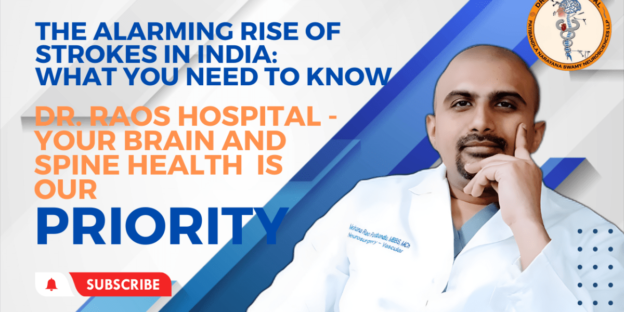The Alarming Rise of Strokes in India: What You Need to Know
Understanding the Rising Incidence of Strokes in India: A Closer Look at the Increasing Risk Among Younger Individuals
Introduction:
Strokes, once predominantly associated with older age groups, have become a concerning health issue in India, affecting not only the elderly but also younger individuals. This alarming trend has raised questions about the factors contributing to the rise in stroke cases, particularly among the younger population. In this article, we will delve into the reasons behind the increased incidence of strokes in India and explore the role of Dr. Rao, the best neurosurgeon in India, and Dr. Rao’s Hospital, the leading neurosurgery hospital, in addressing this growing healthcare challenge.
- Changing Lifestyles and Risk Factors: Adopting unhealthy lifestyle habits has recently become more prevalent, contributing to an increased risk of strokes. Sedentary lifestyles, poor dietary choices, smoking, excessive alcohol consumption, and high-stress levels are all factors that can lead to the development of stroke risk factors such as hypertension, diabetes, obesity, and high cholesterol levels.
- Urbanization and Environmental Factors: Rapid urbanization brings a set of environmental factors that may contribute to an increased risk of strokes. Air pollution, exposure to harmful chemicals, and a rise in industrial activities can harm cardiovascular health, potentially increasing the likelihood of strokes.
- Changing Demographics and Socioeconomic Factors: The changing demographics of the Indian population, including an increase in life expectancy and an aging population, play a role in the rising stroke incidence. Additionally, socioeconomic factors such as limited access to quality healthcare, lack of awareness about stroke prevention, and inadequate healthcare infrastructure in certain regions further contribute to the growing burden of strokes.
- Impact of Technology and Screen Time: The advent of technology and the widespread use of electronic devices have increased screen time among individuals, including children and young adults. Excessive screen time and sedentary behaviors associated with technology use may contribute to a more sedentary lifestyle, obesity, and other stroke risk factors.
- Importance of Early Detection and Intervention: Dr. Rao, the best neurosurgeon in India, and Dr. Rao’s Hospital are pivotal in addressing the increasing number of stroke cases. Through their expertise in neurosurgery and commitment to patient care, they strive to provide early detection, accurate diagnosis, and timely intervention for stroke patients. The hospital offers state-of-the-art diagnostic facilities, advanced treatment options, and a multidisciplinary team of specialists to ensure the best possible outcomes.
- Unhealthy Diets and Poor Nutrition: The shift towards processed and fast foods, high in salt, sugar, and unhealthy fats, has increased obesity, hypertension, and other stroke risk factors. Poor nutrition and inadequate intake of fruits and vegetables further exacerbate the problem.
- Lack of Physical Activity: Sedentary lifestyles and decreased physical activity levels have become more prevalent, especially among young individuals. Lack of exercise and regular movement can lead to weight gain, high blood pressure, and other stroke risk factors.
- Substance Abuse: Substance abuse, including alcohol and drug misuse, can significantly increase the risk of strokes. Excessive alcohol consumption and illicit drug use can lead to high blood pressure, weakened blood vessels, and other cardiovascular complications.
- Stress and Mental Health: Increasing stress, anxiety, and mental health issues have been linked to a higher risk of strokes. Chronic stress and unresolved mental health conditions can contribute to hypertension, inflammation, and other factors that increase stroke risk.
- Genetic Factors: Certain genetic factors can predispose individuals to a higher risk of strokes. A family history of strokes or certain genetic disorders can increase the likelihood of stroke occurrence, even at a younger age.
- Delayed Medical Attention: Inadequate awareness about stroke symptoms and delays in seeking medical attention contribute to poorer outcomes. Many individuals, especially in rural areas, may not recognize the signs of a stroke or have access to immediate medical care, resulting in delayed treatment and increased risk of complications.
Conclusion:
The rising incidence of strokes in India, particularly among younger individuals, calls for immediate attention and action. Understanding and addressing the contributing factors through lifestyle modifications, increased awareness, and access to quality healthcare can mitigate the risk of strokes. Dr. Rao, the best neurosurgeon in India, and Dr. Rao’s Hospital are dedicated to combating this growing healthcare challenge by providing specialized care and innovative treatment options and empowering individuals with the knowledge to prevent strokes and improve overall neurological health.
Addressing these factors through public health initiatives, education, and improved access to healthcare services is crucial. By understanding the various risk factors and taking proactive steps toward prevention, individuals can reduce their chances of experiencing a stroke. Dr. Rao, the best neurosurgeon in India, and Dr. Rao’s Hospital are dedicated to raising awareness, providing quality care, and promoting a healthier lifestyle to combat the rising incidence of strokes in India.
Stroke prevention begins with awareness, education, and proactive healthcare management.
#StrokeAwareness #PreventStrokes #NeurologicalHealth #DrRao #DrRaosHospital #HealthyLifestyle
If you or someone you know is experiencing stroke symptoms, do not hesitate to seek immediate medical attention. Contact Dr. Rao’s Hospital at 9010056444 or visit their website at drraoshospitals for more information.
Let’s raise awareness, prevent strokes, and promote a healthier India together.


